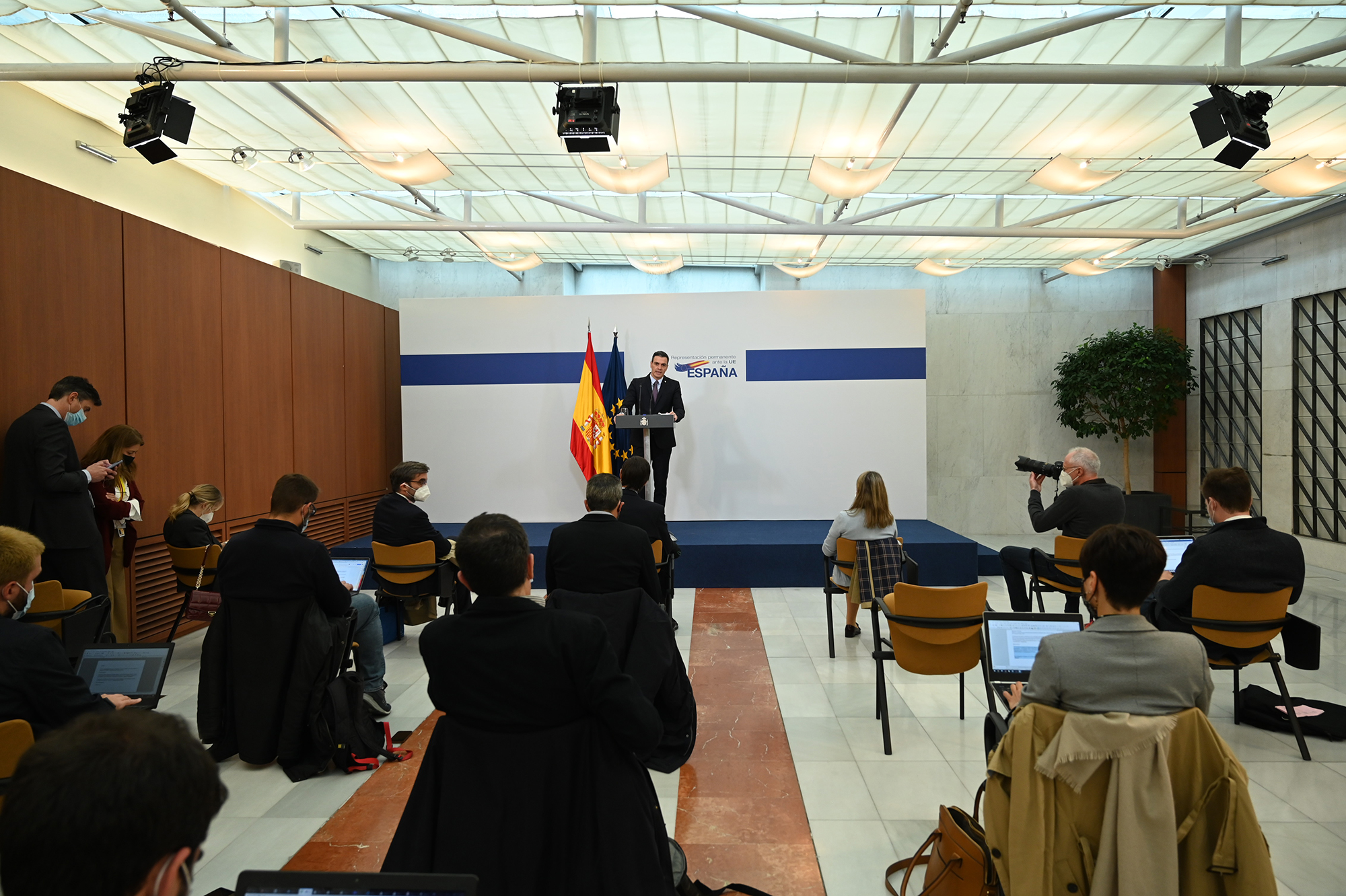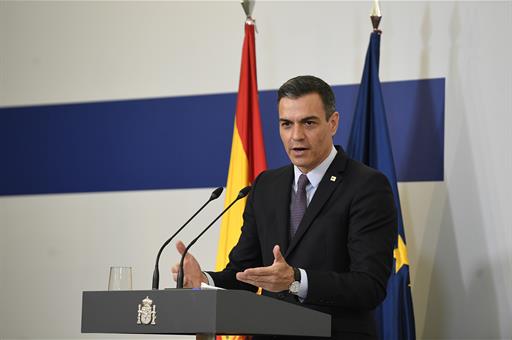Extraordinary European Council in Brussels
Sanchez: "Solidarity in the distribution of vaccines is a political and epidemiological issue; no one is safe until we are all safe"
President's News - 2021.5.25
Brussels (Belgium)
The 27 decided to adopt sanctions against Belarus after it demanded the forced landing in Minsk of a flight from Athens on its way to the Lithuanian capital.
European leaders have welcomed the good progress of the vaccination process in Europe: the EU will this week reach the milestone of 50% of the population with one dose of the vaccine administered. In the case of Spain, President Sánchez highlighted the good data in our country and assured that the goal of achieving 70% of the Spanish population vaccinated before the end of the summer "is getting closer and closer".
Secondly, the 27 were pleased to have reached an agreement for the COVID Digital Certificate to be launched in June. They also addressed the issue of vaccinations in the rest of the world by agreeing to donate 100 million doses to vaccinate health workers and vulnerable groups around the world, under the maxim "no one is safe until we are all safe". In this regard, the President stressed that the European Union has exercised "clear leadership" in the global roll out of the vaccine, exporting more than 200 million doses produced within the EU. For this reason, and to allow the EU to continue with this leadership, Sánchez once again emphasised the three pillars that he advocated at the Oporto Summit: promoting knowledge transfer, increasing vaccine production and speeding up the distribution of vaccines. In this sense, he defended the importance of approving a European mechanism for sharing vaccines "as soon as possible", which channels the additional solidarity of the Member States in an "streamlined and coordinated" manner.
The Council also took up the European climate agenda to realise its commitment to an ambitious 55 per cent emissions reduction by 2030. Sánchez stressed that the targets must be achieved in a "fair and equitable" way, "putting people at the centre of the process", and argued that the European Emissions Trading System (ETS) must play a central role, so that it continues to give a clear signal on the price of carbon.
Spain, Morocco's best ally within the EU
 Foto: Pool Moncloa/Borja Puig de la BellacasaFollowing the mass arrival of immigrants from Morocco to two Spanish cities, particularly Ceuta, which triggered "an unprecedented crisis between the EU and Morocco", the President thanked European institutions for their support and solidarity with Spain in the face of the migratory crisis with the Alaouite kingdom. "The Spanish borders are Europe's borders", said the President of the Council, Charles Michel, who assured that the European migration pact will be an issue addressed at the next meeting of European leaders in June.
Foto: Pool Moncloa/Borja Puig de la BellacasaFollowing the mass arrival of immigrants from Morocco to two Spanish cities, particularly Ceuta, which triggered "an unprecedented crisis between the EU and Morocco", the President thanked European institutions for their support and solidarity with Spain in the face of the migratory crisis with the Alaouite kingdom. "The Spanish borders are Europe's borders", said the President of the Council, Charles Michel, who assured that the European migration pact will be an issue addressed at the next meeting of European leaders in June.
Sánchez reminded Morocco that "there is no better or greater ally within the European Union than Spain to defend its strategic interests," and added that our country wants to have a relationship that is "as constructive as possible", based on "trust and respect for the European and Spanish borders of Ceuta and Melilla". He also stressed that Spain is always working to ensure that its important work in the management of migratory flows on the continent is recognised. The president stressed that in 2018, the EU provided Morocco with 140 million euros for migration management, with Spain's support.
Strategic debate on Russia and new sanctions against Belarus
Under the Union's external relations item, the Council held an intensive strategic debate on Russia, condemning Russia's "illegal and provocative activities" against the EU. "Russia continues to challenge our interests and values," said European Commission President Ursula von der Leyen, who assured that they will present a report at the June EUCO on the state of the relations.
As part of this debate, the 27 have adopted measures against Belarus following the forced landing of a flight from Athens to the Lithuanian capital, which landed in Minsk on the demand of Lukashenko regime. This is "absolutely unacceptable", said Sánchez. "We believe it is important to condemn these events and demand the Belarusian regime release all passengers," referring to opposition journalist Roman Protasevich and his partner. Among the sanctions adopted, the Council decided to extend the list of persons banned from entering the EU, and to isolate the country by air, banning Belarusian airlines from entering EU airspace and asking European airlines not to fly over Belarus. The Commission President announced that there will also be further economic sanctions.
Non official translation





